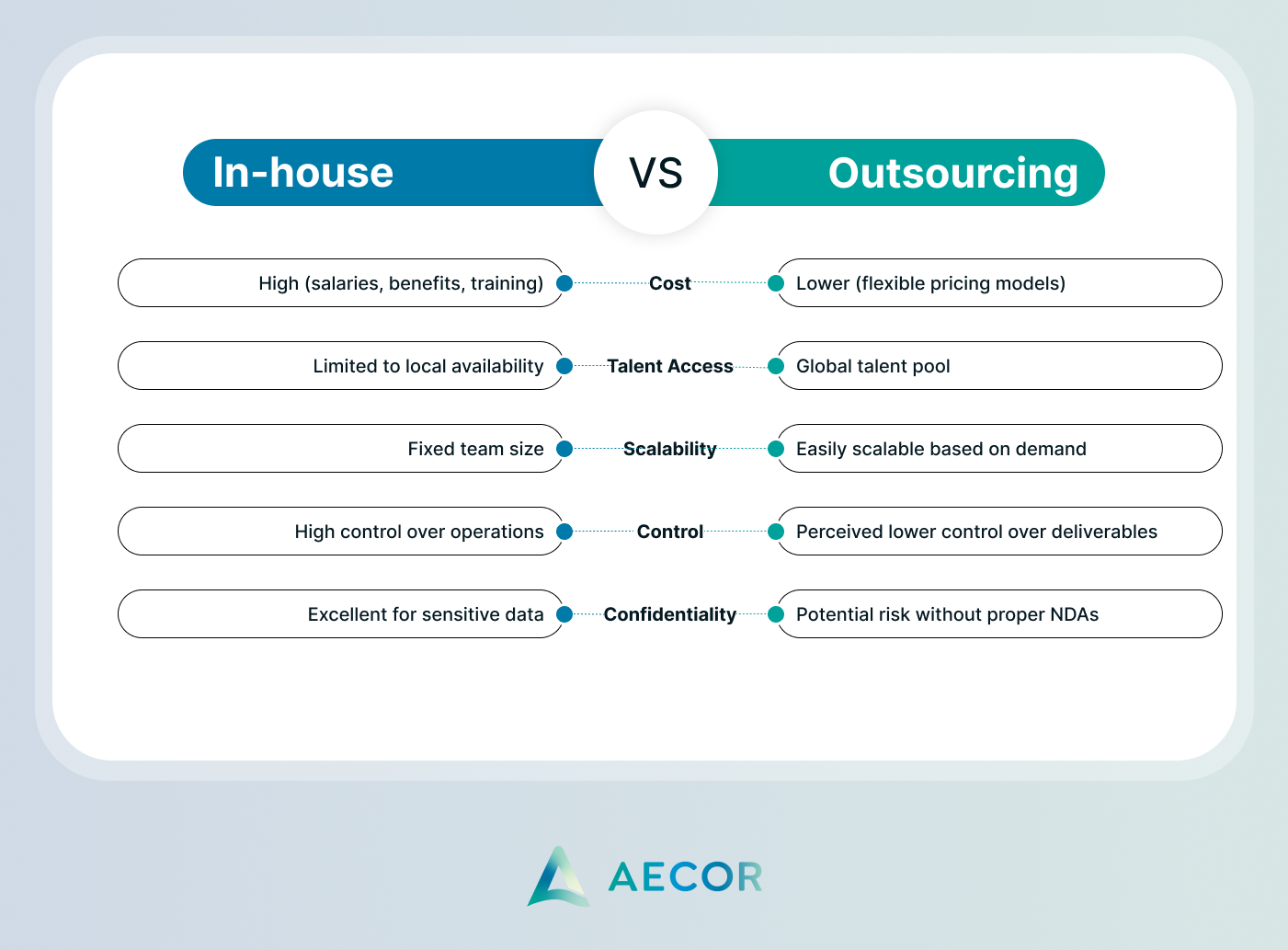In-house vs outsourcing: Which model suits your business in 2025?

Deciding whether to build an in-house team or outsource key functions is a pivotal challenge for modern businesses. This decision can significantly impact efficiency, cost, scalability, and long-term growth. In this guide, we’ll explore the benefits and challenges of both models, provide actionable advice, and share how to strike the perfect balance with a hybrid approach.
The case for in-house teams
In-house teams can offer advantages that directly impact organisational culture and day-to-day operations.
1. Organisational cohesion
- Having an in-house team fosters a unified company culture. Shared values, goals, and camaraderie naturally develop, making collaboration and alignment easier.
2. Real-time collaboration
- In-house teams allow for immediate problem-solving, brainstorming, and decision-making. No delays caused by time zones or language barriers.
3. Enhanced confidentiality
- For businesses handling sensitive data or proprietary tools, in-house teams provide greater control over intellectual property and security.
Challenges of in-house teams
While in-house teams offer distinct advantages, they come with notable challenges.
High Hiring & Retention Costs
- Recruiting skilled developers, designers, and project managers is expensive and time-consuming.
- Competitive salaries, benefits, training, and workspace add to operational costs.
- Retention is a challenge as skilled professionals seek better opportunities frequently.
Limited Expertise & Scalability
- An in-house team might lack experience with diverse projects or emerging technologies.
- Scaling up for new projects requires additional hiring, which can be slow and costly.
- Specialised roles like UI/UX designers, DevOps, or cybersecurity experts may not always be justified in-house.
Slower Time-to-Market
- Hiring, onboarding, and team coordination take time before actual development begins.
- Project delays occur due to limited team capacity and knowledge gaps.
- Rapid technological advancements require continuous upskilling, which may slow down delivery.
Infrastructure & Compliance Burden
- Maintaining software development infrastructure, tools, and licenses is costly.
- Compliance with industry standards (GDPR, HIPAA, PCI DSS) requires expertise and additional investment.
- Security risks increase if the in-house team lacks cybersecurity expertise.
Lack of External Perspective
- In-house teams may develop a tunnel vision, limiting innovation and fresh problem-solving approaches.
- Exposure to only one type of project or industry can reduce adaptability.
- External agencies bring diverse experiences and creative solutions from working with multiple businesses.
Why outsourcing works for businesses
Outsourcing has become a strategic choice for businesses seeking flexibility and cost optimisation.
1. Cost optimisation
- Outsourcing can reduce operational expenses significantly. Studies show businesses can save up to 13% on costs by outsourcing non-core functions.
2. Access to global talent
- Outsourcing allows you to tap into a global talent pool, gaining specialised skills and expertise unavailable locally.
3. Scalability and flexibility
- Outsourcing offers the ability to scale operations based on demand, ensuring you aren’t overstaffed during slow periods or understaffed during peak times.
Challenges of outsourcing
While outsourcing is advantageous, it’s not without its drawbacks.
1. Communication barriers
- Time zones and cultural differences can lead to miscommunication or delays in project delivery.
2. Perceived loss of control
- Entrusting critical business functions to third-party vendors can feel like relinquishing control over quality and deadlines.
How to decide: In-house, outsourcing, or both?
Many businesses are adopting a hybrid model, combining in-house teams for core operations with outsourcing for specialised or non-core tasks. Here’s how to decide:
1. Identify core vs non-core functions
- Core functions that require close collaboration or handling sensitive data may be better suited for an in-house team.
- Non-core tasks like IT support, digital marketing, or software development can often be outsourced efficiently.
2. Evaluate Costs
- Compare the cost of hiring, training, and maintaining an in-house team with the expenses of outsourcing the same functions.
3. Assess scalability needs
- If your workload fluctuates, outsourcing can provide the flexibility to scale resources up or down as needed.
4. Research outsourcing partners
- Look for outsourcing partners with proven track records, strong communication practices, and expertise in your industry.
How Aecor bridges the gap
At Aecor, we specialise in offering businesses the best of both worlds:
- UK-based client relations: Enjoy seamless communication and project management without time zone or language barriers.
- India-based development team: Access global talent and expertise at competitive rates for software, web, and mobile app development.
- Scalable and customisable solutions: Whether you’re a startup or an enterprise, we adapt to your needs with flexible, cost-effective services.
Client success story:
A growing UK-based startup partnered with Aecor to outsource their app development. By leveraging Aecor’s hybrid model, they reduced costs by 20% and launched their app 3 months ahead of schedule—a milestone that positioned them as industry leaders.
FAQs: In-house vs outsourcing
1. What are the advantages of outsourcing?
- Cost savings, access to global talent, and scalability make outsourcing a strategic choice for businesses looking to optimise resources.
2. When is an in-house team better?
- In-house teams are ideal for functions requiring close collaboration, tight security, or deep integration with your company’s core processes.
3. What is a hybrid model?
- A hybrid model combines in-house teams for core tasks and outsourcing for specialised or non-core functions, providing flexibility and cost-efficiency.
4. How can Aecor help with outsourcing?
- Aecor provides UK-based client management and India-based development, ensuring quality, cost savings, and seamless communication.
Take the next step with Aecor
Ready to optimise your business operations? Partner with Aecor for scalable, cost-effective outsourcing solutions tailored to your needs.
Related insights
What our clients say













